Final Fantasy XI
Vana 'Diel, or shall I?
MMORPGs are comfortably the most hated of games for a reviewer to critique. This is partly because, even if you do spend one whole month of your life playing solely this game (during which time you can earn no money from other work to feed yourself or your family) everybody that is currently playing the game moans and bitches that you haven't played it enough yet and it's only 600 days in when your ninja character with thief sub-job reaches level 75 and completes his set of AF armour that the game really begins to make sense.
But it's mainly because, unlike offline games, online RPGs are not self-contained blocks of gameplay and narrative with a start, a middle and an end. Rather, they are infinitely shifting, enormous structural playpens that exist primarily to breed and facilitate human relationships; the life and love that traditionally surrounds games rather than inhabits them. The game only really begins to make sense 600 days in when your ninja character with thief sub-job reaches level 75 and completes his set of AF armour because it's only when you get that far in that you realise that the fun you've had hasn't really had much to do with the game at all.
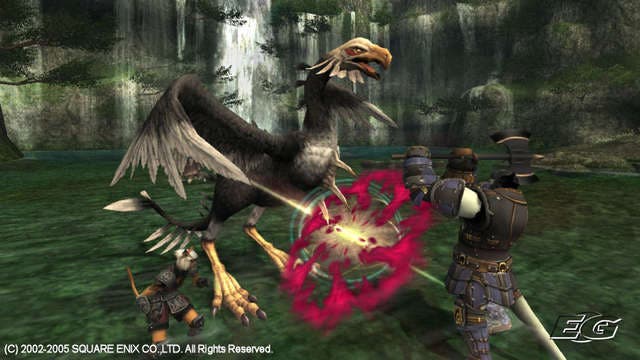
Street Fighter 2 amazed because there was community gathered around the arcade cabinet. We all jeered or revered each other while watching and learning new techniques together: a group of humans bound and strengthened by a communal gaming focus. The experts helped the newbies until the newbies beat the experts and the circle of strife completed.
We all have known that feeling of kinship through shared interactive addiction and affection, whatever the game in whatever the space in time. MMORPGs are the same except moreso a hundred times over: their community is perpetually bred from within.
One could write for hours about what a wonderful place Sweden is to live: the sights and sites and sounds and pros and cons of its society's structures. You could wax lyrical about how the laws are so very well thought out and the town planning and education and health and police and transport mechanics are perfectly implemented. But really, your quality of experience in Sweden is only partly influenced by these things. What really makes it a good place to live in are the people you encounter while there; that interplay of human relationship that makes life what it is.
And so that is why MMORPGS are impossible games to review within the traditional critical framing question of: "How much fun will I have here?"
How much fun you will have there is only partially dictated by what the game's creators put in place. The rest is down to the life that fills that framework.
So, all one can really do is pull out a photograph of Final Fantasy XI for you to look at and, in doing so, simply give you the opportunity to see what those who love her see.
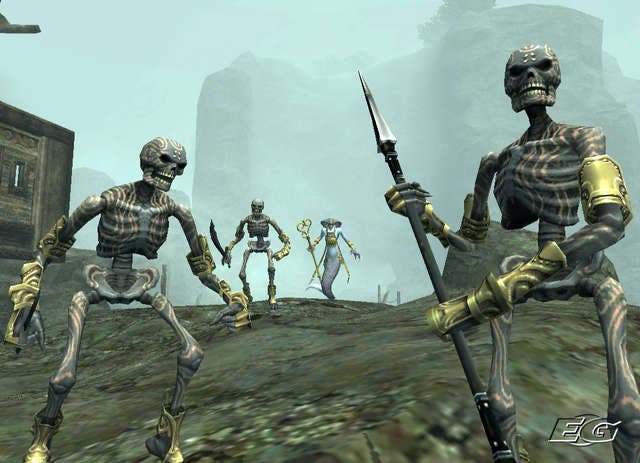
Like Sweden, FFXI's society and scenery is built from hundreds of tiny building blocks. It has races and racism, transport systems and ticket offices, vocations and money, smoking cities and gleaming landscapes, savage monsters and dark dangers, sparkling oceans and swimming skies and hope and death and fishermen and swords and mayors and farming and furry thongs and enough of the paraphernalia of life to persuade you to emigrate from atomic reality to pixel virtuality.
Indeed, when you pick the game's box from the shelf at your local retailer or add it to your basket online, know this: you're not so much holding a videogame as a passport. Your new identity, new home, new face written in zeroes and ones and burned to a disk with which you can trade life in this world for life in that world.
In your hands you hold the rabbit hole to wonderland; the wardrobe to Narnia; the trunk of the faraway tree, the cyclone to Oz, the gate leading away from the hobbit's shire.
The red pill.
What price life? £29.99 and £8.99 monthly rent.
Let's imagine for a moment that when you get to this world there's no one else there - the muddying critical modifiers of emotionally charged relationships wiped away. Let's purely and simply chart your first lonesome week in Vana 'Diel. Your first few hours will be spent tentatively stepping out of your adopted home city's gates (Bastok, San d'Oria, Windurst, or Jeuno), before battling a few low-level monsters in an effort to level up your chosen job as quickly as possible while earning a little money to buy some armour. Battles are built on invisible dice rolls so there's seemingly little skill involved at first - simply a battle of your stats versus his.
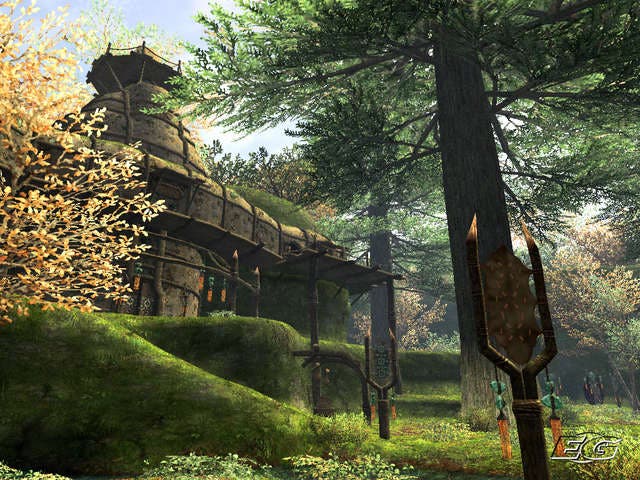
Initially, you're weak and useless and you won't be able to travel very far without dying and subsequently lying hopelessly on the floor crying out in coloured text for a passing mage to revive you. If no one comes to your aid it's a case of respawning back at town, losing a percentage of your experience and starting the process over.
Inside your city various basic quests are available to you, all of which earn a small amount of money to spend at the shops or at the player-run auction houses and enable you to take your first baby steps into the overarching plot. Other players cannot see your interactions with NPCs so everybody plays out their own personal stories silently next to one another. When you have built up enough strength you can venture a little further outside of your city and, if you're lucky or can find an escort, you might make it to the next town along.
This is essentially how the game continues to work for the next 50 years. You get a little stronger so you travel a little further and beat the next slightly harder monsters. You get a little richer doing so and buy some better weapons and armour in order beat the next slightly harder monsters. All the while questing, advancing the story and making new friends draws you from capital letter to full stop.
And it's this final element on which the universe lives or dies. The game positively encourages interaction with other people, many quests only becoming feasible when working in a team. So you must make friends and join a linkshell (a clan whose online members you can speak to at any time no matter where you are). You might decide to meet up at 8pm to help someone else in the linkshell complete a quest they've been struggling with or you might choose to meet up in Brighton next Saturday for a pint. Lives converge in Vana 'Diel and suddenly the potholed roads and crusty levelling fade from view. The game becomes simply a backdrop to existence: a means to an end.
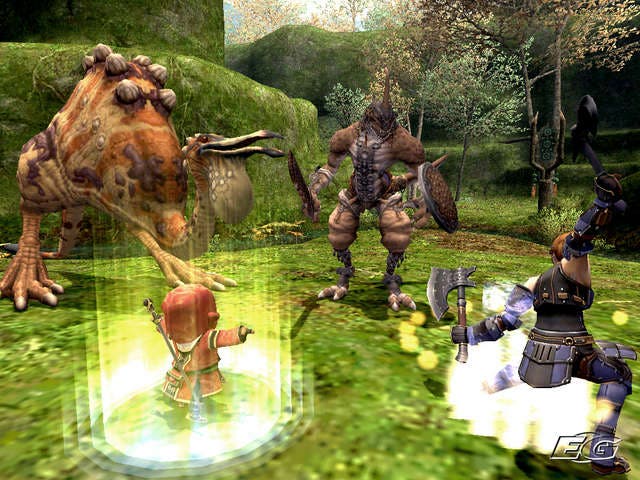
And, sadly, that end isn't always friendship. There are tricksters in Final Fantasy XI - virtual criminals out to win confidence before stealing other player's in-game items or money. There are scammers at the player-operated casinos and rogue beastmasters who would look to deliberately set powerful monsters upon weaker players for sport (Monster Player Killers). Every community is subject to those who would violate it's terms and laws and Final Fantasy XI is no different.
Likewise, its framework is frequently flawed - full of tiny mistakes and design sins that the developer gods should never have infected their world with. Should you fail to meet the right people and form those crucial linkshell relationships then these flaws eventually shatter your play experience. Devoid of community this is essentially just a four-year-old PS2 game (albeit complete with all the expansions, including the latest Treasures of Aht Urhgan), as hurtful as its jagged polygons.
Crucially, the game retains much of the Final Fantasy DNA - Moogles and Chocobos and airships and jobs and Cid and orphans and any number of the unifying threads the series enjoys running through its coded veins. So for the Final Fantasy fan, this is the live-in dream. But, these trappings of Square-Enix's most treasured IP will do little to compel the friendless player to push on sixty hours down the line - and sixty hours will be just the beginning of your commitment if you wish to see this through to the end. Well, an end.
Indeed, the MMORPG is a genre for people with few commitments. When you take one on you take on a new life: one that makes almost as many demands of you to succeed as this one. The key difference between its reality and ours is that if you follow the game's guidebooks and fansites and tirelessly chip away at life in the game, you will slowly but surely succeed - at least in the traditional western 'get-more-powerful, have-more-things, be-able-to-beat-bigger-monsters' type way.
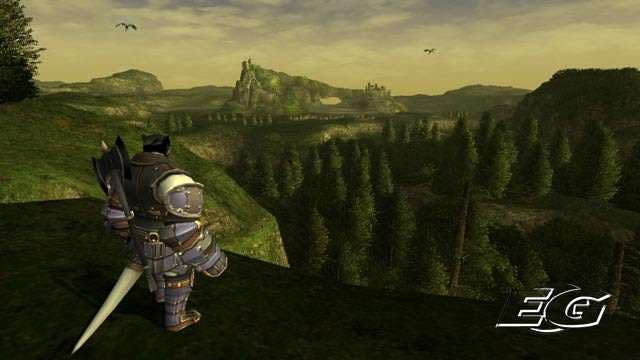
Real life isn't so simple and perhaps therein lies the appeal. For teenagers or reclusive twentysomethings and northwards, the MMORPG provides an escape; A preferable world where the other players largely share the same interests as you and where the rules and boundaries are clearly defined and easy to work within - providing you have the time. Perhaps then the MMORPG genre is best suited for the young - those yet to fully find their place and purpose in real life - or the old - where the game allows a fresh start and challenge from the bottom of the social ladder when all your cards in this life have already been played.
In this world there are faults deep and as wide corrupting the framework but, unmistakably, there's the potential for glory, wonder and passion to be woven into the tapestry of your play experience; unscripted flashes of soul tugging brilliance as your team slays that dastardly notorious monster after an hour of intense strategising or when a high-level white mage brings you back to life when you thought all hope was lost as you lay unconscious in the belly of that mythril mine. Those are the moments that are unique to you. Again: in creating an MMORPG, the developer doesn't script create amazing gameplay moments for you like in most games - they simply create the place for them.
Attributing a numerical value to this world is about as ridiculous as giving London four out of ten because it needs a good wash. Sure, remove the other people and the resultant empty shell is clearly showing it's age. There's potential for lonely nights of wandering aimless and lost, grinding against the game's antiquated cogs and mechanisms for scant little reward: An ageing face, furrowed brow, grey hair and an awkward gait. Two out of ten.
But overlay the living, breathing, bustling society that inhabits this land and mix in Final Fantasy's still compelling mythologies and there's no denying the potential for life-affirming, memorable and wonderful adventures filled with glimpses of real life truth, beauty and awe: A mature, life-chiselled face full of the confidence of having lived and won and worked out its place in life. Ten out of ten.
The truth of the situation lies somewhere in between, because even hardened FF fans can't escape the fact that this is little more than a solid, functional port of a four year old game. As potentially enjoyable as it is (if you put the hours in), and as much content as there is in this all-encompassing release (if you really put the hours in), things have moved on considerably in the MMO scene in the intervening years. 360 owners deserve a lot more than a re-re-issue for their money.




